We all know that dementia is a condition commonly encountered with age. But are you aware that dementia is just an umbrella term used to describe the common signs of decline in brain function? There are indeed a number of different types of dementia caused by various factors, presenting with a variety of symptoms and treated in different ways.
Lewy body dementia (LBD) is one such form of dementia. It is complex, relatively rare, and shares some similarities with Alzheimer’s disease and Parkinson’s disease, characterized by the presence of abnormal protein deposits, known as Lewy bodies, in the brain.
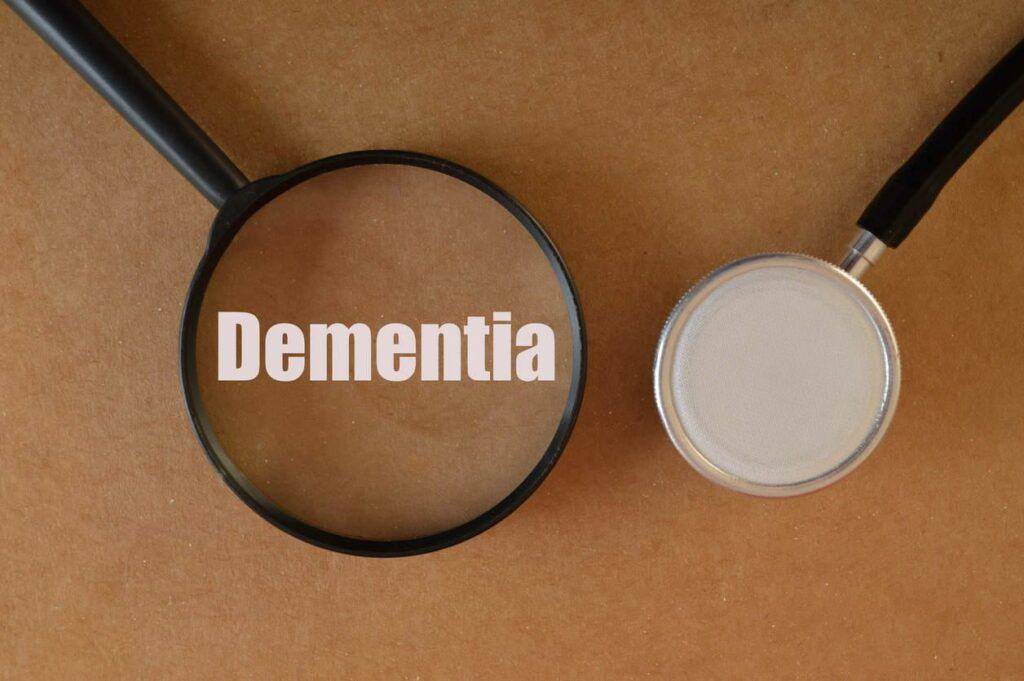
LBD encompasses two main clinical diagnoses: dementia with Lewy bodies and Parkinson’s disease dementia, both of which have similar underlying pathology.
This article will shed some light on
- the discrepancies between LBD and other forms of dementia,
- the stages of this progressive cognitive condition,
- the methods of diagnosing,
- the treatment options, and
- will offer some coping strategies for patients and their families.
How Lewy Body Dementia Differs From Other Types
Some
key features and differences of Lewy body dementia compared to other types of dementia, such as Alzheimer’s disease, are:
The presence of Lewy Bodies
One of the distinguishing features of Lewy body dementia is the presence of Lewy bodies, which are abnormal deposits primarily composed of the protein alpha-synuclein. This protein is usually present in the brain and helps neuron cells to transmit impulses. In contrast, people with Alzheimer’s disease have clumps of beta-amyloid plaques and tau tangles proteins.
Specific Cognitive Symptoms
Both Lewy body dementia and Alzheimer’s disease involve cognitive impairment, but the patterns of cognitive decline can differ. In LBD, symptoms of decline in brain function often include fluctuations in alertness and attention, visual hallucinations, and executive function deficits. Alzheimer’s disease typically presents with memory loss as an early and prominent symptom.
Problems with Motor Function
If your loved one has been diagnosed with Lewy body dementia, they may experience motor symptoms similar to those seen in Parkinson’s disease. Tremors, rigidity, and bradykinesia (slow movement) can appear before or after the cognitive symptoms. In contrast, Alzheimer’s disease does not typically include these motor features.
Hallucinations
Visual
hallucinations are a common early symptom, occurring in a significant proportion of individuals with Lewy body dementia, about 70%. While hallucinations can occur in other types of dementia, they are especially prominent in LBD.
Fluctuating Alertness
People with LBD often have distinct changes in alertness and cognition. They may have periods of clarity and lucidity followed by episodes of confusion and disorientation. These fluctuations are less typical in Alzheimer’s disease.
REM Sleep Behavior Disorder (RBD)
RBD, a condition in which the person sleeping physically acts out dreams during sleep, is more commonly associated with Lewy body dementia and Parkinson’s disease. Over 70% of
people diagnosed with RBD are likely to develop LBD in about a decade as it can precede the onset of cognitive symptoms by years.

Major Depression
It has been noticed that people with LDB often suffer from major depression as well. In comparison, the numbers are very different when we look at seniors with Alzheimer’s disease. Close to a quarter of all people diagnosed with LBD also suffer from
major depression, while depressed patients with Alzheimer’s are a little over 9%.
Response to Medications
Individuals with LBD can be extremely sensitive to certain medications, including antipsychotic drugs commonly used to manage behavioral symptoms in dementia. These medications can lead to severe adverse reactions, including increased confusion and motor dysfunction.
Diagnosis
Diagnosing Lewy body dementia can be challenging, as its symptoms can overlap with other types of dementia. A definitive diagnosis often requires a thorough clinical assessment, neuroimaging, and sometimes cerebrospinal fluid analysis.
It’s important to note that while LBD has distinct features, it can also coexist with Alzheimer’s disease or other types of dementia, leading to a condition known as
mixed dementia.
What Are The 7 Stages Of Lewy Body Dementia
Lewy body dementia (LBD) is often described in stages to help understand the progression of the disease. These stages are only general guidelines, as each person may progress through them at varying rates or experience different symptoms.
Additionally, as LBD encompasses two main clinical diagnoses, dementia with Lewy bodies (DLB) and Parkinson’s disease dementia (PDD), the stages may differ slightly between these subtypes.
If your loved one has been diagnosed with Lewy body dementia, the following description of the stages of LBD can give you an idea of what kind of symptoms and changes you can expect to see.
Stage 1: Early Stage
- Mild Cognitive Changes: Your beloved may experience mild memory problems, difficulty multitasking, and occasional confusion. These are hard to notice for others.
- Fluctuations in Alertness: You may witness fluctuations in their cognitive function, with periods of relative clarity and alertness alternating with episodes of confusion or reduced attention.
- Visual Hallucinations: Vivid and detailed visual hallucinations are common and can occur frequently.
- REM Sleep Behavior Disorder (RBD): This sleep disorder, characterized by physically acting out dreams during sleep, may be present in this stage.
- Parkinsonism: Some people with LBD may exhibit early signs of Parkinsonism, including tremors, rigidity, and bradykinesia (slowness of movement).
Stage 2: Mild Cognitive Impairment
- Progression of Cognitive Symptoms: Cognitive decline becomes more noticeable, impacting daily functioning. Your loved one may also have difficulties finding the right words.
- Fluctuations Persist: Their shifts in cognitive function and alertness continue to occur.
- Motor Symptoms: Parkinsonism may become more pronounced, leading to greater motor difficulties.
- Visual Hallucinations: Hallucinations remain a common symptom.
Stage 3: Moderate Cognitive Decline
- Increasing Cognitive Impairment: At this stage, your beloved may experience more significant cognitive decline, affecting memory, problem-solving, and language skills.
- Hallucinations and Delusions: Visual hallucinations and delusions (false beliefs) may become more frequent and distressing.
- Motor Symptoms: Parkinsonism continues to progress, leading to greater motor challenges.
- Autonomic Dysfunction: Autonomic nervous system dysfunction can cause issues like orthostatic hypotension, constipation, and urinary incontinence.
Stage 4: Severe Cognitive Decline
- Severe Cognitive Impairment: Often, people have substantial cognitive deficits, including severe memory loss and impaired communication.
- Physical Dependence: Your loved one would require assistance with activities of daily living (ADLs) as their motor symptoms and cognitive impairment worsen.
- Vulnerability to Infections: They might become more prone to infections due to a weakened immune function.
- Speech and Swallowing Difficulties: Their speech may become unintelligible, and swallowing problems may arise.
Stage 5: Very Severe Cognitive Decline
- Advanced Cognitive Decline: Your beloved may lose the ability to recognize loved ones and may become nonverbal.
- Functional Dependency: They need constant assistance with ADLs, may have bladder issues, or become bedridden.
- Movement Issues: Parkinsonism and motor difficulties are pronounced.
- Increased Risk of Pneumonia: Aspiration pneumonia, which happens when food or liquid is inhaled instead of swallowed, becomes a significant concern due to swallowing difficulties.
Stage 6: Near Total Dependency
- Severe Cognitive Impairment: Your beloved would have minimal cognitive function and limited communication abilities.
- Full-Time Care: They will need around-the-clock care for all aspects of daily life.
- Physical Decline: They may experience severe muscle stiffness, rigidity, and immobility.
- Bedridden State: At this stage, most individuals are confined to a bed or chair.
- Length: This period may last around two and a half years.
Stage 7: End-Stage LBD
- Profound Cognitive and Motor Impairment: Essentially nonresponsive and with only minimal cognitive function, at this stage, people with LBD would have lost the ability to swallow, speak, and eat.
- Terminal Stage: This stage marks the end of life, and individuals may experience complications such as infections.
- Palliative Care: Care should focus on providing comfort and relief from pain and distress.
- Length: This stage typically continues from twelve to twenty-two months.
The progression of LBD can look very different for different people. Symptoms and stages can vary widely from person to person, and not all individuals will have all symptoms or go through all stages.
If you or someone you love has an LBD, it’s essential to work closely with healthcare professionals and dementia care specialists to develop a tailored care plan, stay under observation, and manage the symptoms in the best possible way throughout all stages of the disease.
How Is Lewy Body Dementia Diagnosed?
Diagnosing Lewy body dementia (LBD) can be challenging, as its symptoms can overlap with other cognitive disorders, such as Alzheimer’s disease and Parkinson’s disease.
A comprehensive evaluation by a neurologist or a specialist in dementia care is crucial for an accurate diagnosis. The diagnostic process typically involves the following steps:
- Clinical Assessment
The doctor begins by conducting a detailed clinical assessment. This includes taking a comprehensive medical history and a physical exam. They will gather information about your loved one’s symptoms when they were first noticed and their progression over time.
- Cognitive and Neuropsychological Testing
Standardized cognitive tests and neuropsychological assessments are performed to evaluate the individual’s cognitive function, memory, executive function, and other mental abilities. These tests can help identify cognitive impairment and distinguish LBD from other conditions.
- Evaluation of Motor Symptoms
Together with the cognitive tests, the dementia care specialist will assess any motor symptoms, such as tremors, muscle rigidity, and bradykinesia (slowness of movement), which are common in LBD and may help differentiate it from other types of dementia.
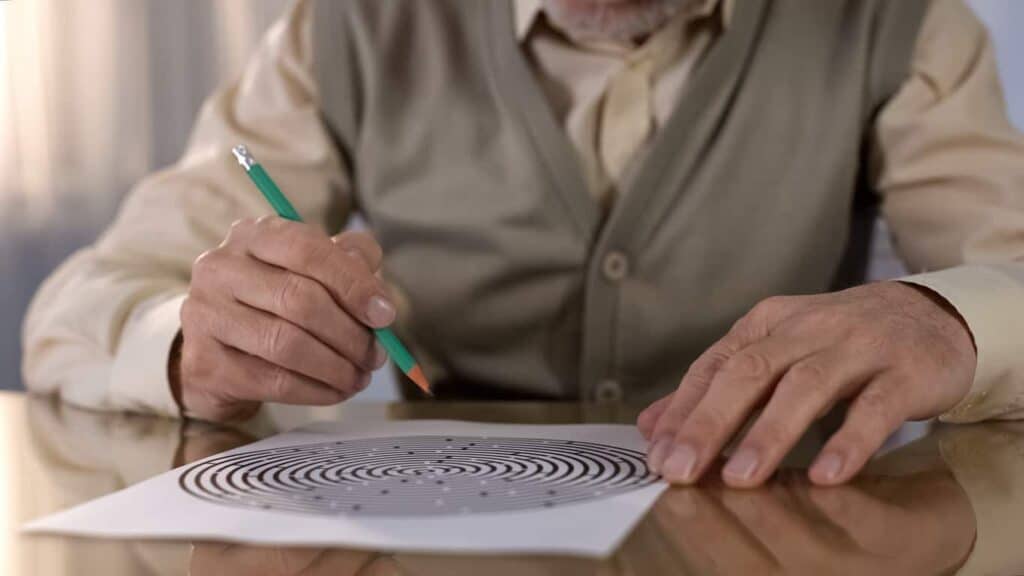
- Assessment of Behavioral and Psychiatric Symptoms
Since psychiatric symptoms like visual hallucinations, delusions, and mood disturbances are significant factors in diagnosing LBD, the doctor needs to determine if these are present.
- Fluctuations in Alertness
The healthcare provider will inquire whether there have been any ups and downs in alertness, attention, and cognition, all characteristic of LBD.
- Sleep Behavior
Information about sleep disturbances, including REM sleep behavior disorder, is obtained, as RBD is more common in LBD.
- Review of Medications
A review of current and past medications is crucial, as certain drugs can worsen LBD symptoms. Additionally, the healthcare provider will assess whether medication-induced parkinsonism may be a contributing factor to motor symptoms.
- Neuroimaging
Imaging exams, such as MRI (Magnetic Resonance Imaging) or CT (Computed Tomography) scans, may be performed to rule out other possible causes of cognitive decline and to assess your loved one’s brain structure.
- Laboratory Tests
Blood tests may be conducted to rule out other medical conditions that could contribute to brain function impairment, such as thyroid disorders or vitamin deficiencies.
- Cerebrospinal Fluid Analysis
In some cases, cerebrospinal fluid (CSF) analysis may be recommended to assess levels of specific proteins, such as
beta-amyloid and
tau, which can help differentiate LBD from other forms of dementia.
- Dopamine Transporter Imaging
A SPECT (Single Photon Emission Computed Tomography) or PET (Positron Emission Tomography) scan can be performed to assess dopamine transporter levels in the brain, which can help distinguish LBD from other neurodegenerative disorders.
As part of diagnosing the LBD, your healthcare provider will work to exclude other potential causes of cognitive decline, such as vascular dementia, frontotemporal dementia, or other conditions.
The clinical diagnosis is based on a combination of the above assessments. You have to remember that due to the complexity of LBD and the importance of ruling out other possible causes of symptoms, the diagnostic process may take time and require multiple evaluations.
That being said, an early and accurate diagnosis of LBD is essential for appropriate treatment and care planning.

Once a diagnosis is confirmed, you and your loved one can work with healthcare specialists to develop a care plan that addresses symptoms, provides support, and ensures the best possible quality of life.
Treatment and Care of Patients With Lewy Body Dementia
Treatment for Lewy body dementia (LBD) focuses on managing symptoms and providing supportive care, as there is currently no cure for the condition.
Treatment plans should be individualized and may involve a combination of medical, behavioral, and non-pharmacological approaches.
The specific treatment options for LBD can vary depending on the main symptoms and the stage of the disease. Here are the key treatment approaches:
Commonly Prescribed Medications
- Cholinesterase Inhibitors are medications such as donepezil (Aricept), rivastigmine (Exelon), and galantamine (Razadyne). These improve cognitive function and address memory and thinking problems in LBD. They may also help with some psychiatric symptoms.
- Levodopa is a medication used to treat Parkinson’s disease and may be prescribed to manage motor symptoms such as trembling, stiffness, and slowness of movement. However, its use should be monitored closely, as it can potentially worsen psychiatric symptoms in LBD.
- Antipsychotic medications may be prescribed to manage severe psychotic symptoms, such as hallucinations and delusions. However, these drugs can be a double-edged sword as they can have serious side effects and may worsen motor symptoms. Clozapine is a less commonly used antipsychotic that may be considered in specific cases.
- Melatonin supplements may be recommended to address sleep disturbances and promote better sleep patterns.
- Other medications may also be prescribed to manage mood disorders, anxiety, depression, and other psychiatric symptoms commonly associated with LBD after a wholesome clinical assessment.
Physical and Occupational Therapy
These therapies can help individuals with LBD manage motor symptoms, improve mobility, and maintain independence in daily activities.
Speech and Swallowing Therapy
Speech therapists can assist with speech and swallowing difficulties, which become more pronounced in the later stages of LBD.
Sleep Management
Developing and maintaining a consistent sleep routine and addressing sleep disturbances are essential for people with LBD. Non-pharmacological approaches, such as light therapy and behavioral strategies, may be recommended.
Behavioral Interventions
Behavioral strategies can be effective in managing challenging behaviors, including agitation, aggression, and wandering. Techniques like
validation therapy and creating a calm and structured environment can be helpful.
Caregiver Support and Education
Your role as a
caregiver is vital in the management of LBD. Receiving adequate support and education can help you better understand the disease, cope with caregiving challenges, and provide the best possible care to your loved one.
Environmental Modifications
Creating a safe and dementia-friendly environment by removing hazards and minimizing clutter can help prevent falls, accidents, and confusion.
Assistive Devices
Depending on the individual’s needs, assistive devices such as mobility aids, communication aids, and safety alarms can be installed.
Nutritional Support
Managing nutrition and hydration is important, as swallowing difficulties and weight loss can be issues in the later stages of LBD. A registered dietitian can provide guidance on dietary needs and meal planning.
Advance Care Planning
Discussions about end-of-life care preferences and advance directives are essential to ensure that care aligns with your loved one’s wishes.
It’s important to note that treatment plans for LBD should be continually reassessed and adjusted as the disease progresses and new symptoms emerge.
You should work together with your beloved healthcare providers to develop comprehensive care plans that address the physical, cognitive, emotional, and social aspects of the condition while prioritizing your beloved’s comfort and well-being.
Regular follow-up appointments are essential to monitor the effectiveness of treatments and make necessary adjustments.
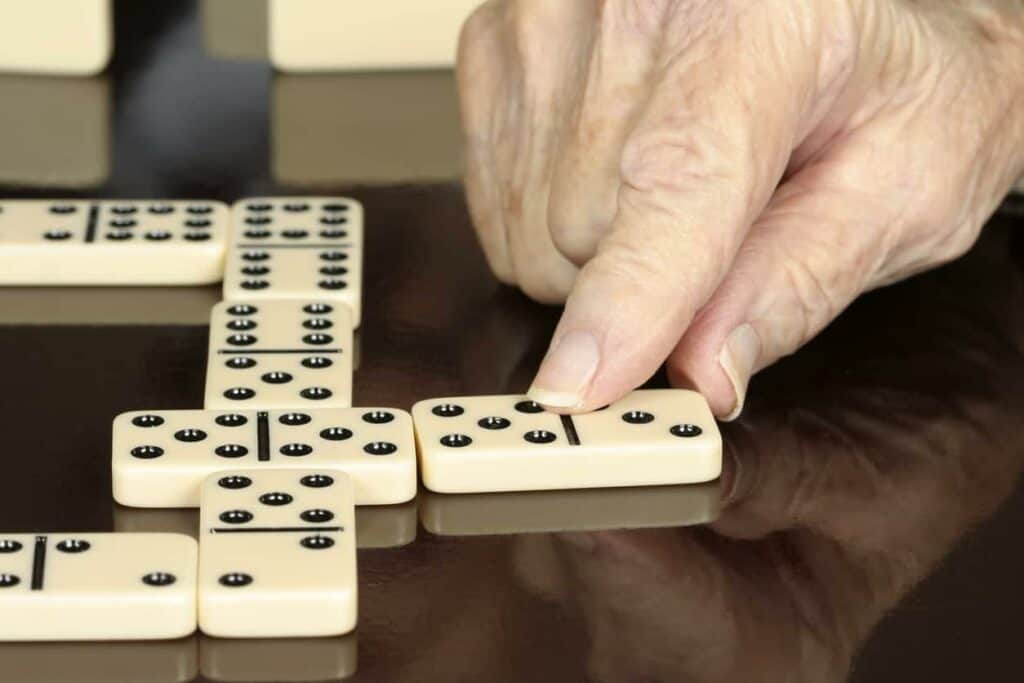
Strategies for Coping with LBD
Since LBD is a complex and progressive disease affecting not only cognitive function but also motor skills and behavior, coping can be challenging for both the person diagnosed with the condition and their families.
We have compiled a list of ways to ease the burden for individuals with LBD and their families.
For People with Lewy Body Dementia:
- Stay Informed
Learn as much as possible about LBD and its progression. Understanding what to expect can help you and your family prepare for the challenges ahead.
- Engage in Cognitive Activities
Doing mental activities like puzzles, word games, and memory exercises can help maintain cognitive function and provide brain stimulation.
- Physical Activity
Equally important is regular physical activity tailored to your abilities. It can help improve mobility and coordination, reduce the risk of falls and depression, and enhance overall well-being.
- Follow a Routine
Establishing a daily routine can provide structure and predictability, which can be reassuring for people having problems with memory. Consistency can help reduce anxiety and confusion.
- Medication Management
If prescribed medications, follow your treatment plan as directed by your doctor. Report any side effects or concerns without delaying them.
- Communication
Maintain open and honest communication with your healthcare team, including doctors, therapists, and caregivers. Express your needs and preferences, and involve your healthcare team in care planning.
- Engage in Supportive Services
Seek out support services tailored to individuals with dementia, such as adult day programs, support groups, and cognitive rehabilitation programs.
- Express Your Feelings
It’s normal to experience a range of emotions, including frustration, sadness, and fear. Share your feelings with trusted family members, friends, or a counselor.
- Safety Precautions
Implement safety measures in your home to prevent accidents and falls. Remove hazards, install handrails, and consider using assistive devices.
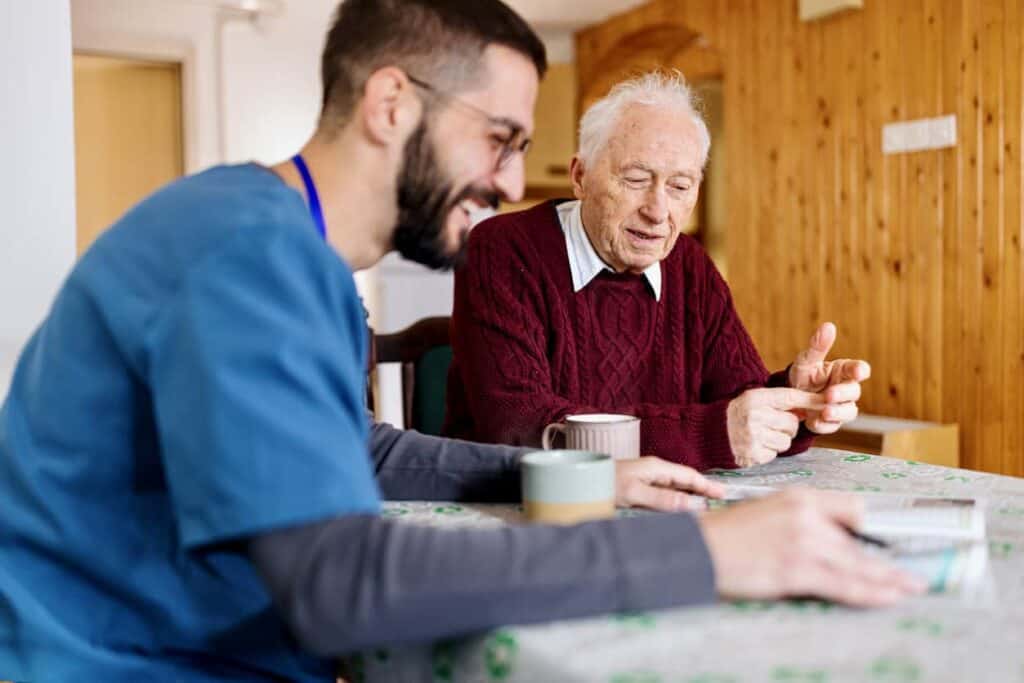
For Families and Caregivers of People with LBD:
- Educate Yourself
Learn about LBD, its symptoms, and its progression. Understanding the disease can help you provide better care and support.
- Build a Support System
Look for and contact support groups and networks for caregivers of individuals with dementia. Connecting with others who are facing similar challenges can provide emotional support and valuable insights.
- Respite Care
Don’t forget to take regular breaks to prevent caregiver burnout.
Respite care allows you to recharge and maintain your own physical and emotional well-being.
- Open Communication
Having open and compassionate communication with your loved one will be beneficial for both of you. Encourage them to express their feelings and preferences.
- Plan Ahead
Discuss and document important decisions related to medical care, legal matters, advance directives, and end-of-life preferences while your loved one can still participate in the decision-making process.
- Promote Independence
Whenever possible, allow your loved one to maintain a sense of independence and control over their life. Encourage their involvement in daily activities.
- Create a Safe Environment
Make necessary modifications to the home to make it a
safe place. Remove obstacles, install grab bars, and supply assistive devices as needed.
- Be Patient
Patience and compassion are priceless when dealing with challenging behaviors or cognitive difficulties. Remember that it’s the disease causing these mood swings and untypical actions, not your beloved.
- Take Care of Your Health
Put your own physical and emotional health first. Ensure that you are getting enough rest, maintaining a healthy diet, and seeking support when needed. Only after you are well will you be able to provide care for your loved one.
- Seek Professional Help
Consult healthcare professionals, social workers, and therapists to address caregiving challenges and obtain guidance on managing specific symptoms.
Coping with LBD requires resilience, adaptability, and a strong network of support.
It’s essential for you, your loved one, and the whole family to work together as a team, relying on each other and seeking help from healthcare professionals and support organizations when needed.
Remember that you are not alone, and there are resources available to assist you on this journey.
How Can Assisted Living Facilities Help?
Assisted living care communities, such as
Amy’s Eden, can offer certain benefits for individuals with Lewy body dementia (LBD) and their families. Thus enhancing the quality of life, safety, and well-being of your loved one by providing specialized care and support tailored to their unique needs.
These benefits could be:
- Specialized Memory Care Programs
Many assisted living communities offer
memory care programs designed specifically for individuals with dementia, including the Lewy Body type. Such programs provide a structured and safe environment with trained staff members who can understand the unique challenges associated with LBD and provide appropriate care and support.
- Safe and Secure Environment
Assisted living facilities that offer dementia care have secure and monitored environments with controlled access to prevent wandering, a common behavior in LBD. Secure outdoor areas and wandering paths can allow residents to move freely while staying safe.
- Structured Daily Routine
A consistent daily routine is extremely helpful to people with LBD as it aids in managing their symptoms and reduces confusion. Assisted living facilities provide structured schedules that include meals, activities, and therapies, helping to regulate sleep-wake cycles and establish a sense of predictability.
- Medication Management
Taking the right doses at the right time is crucial in the management of LBD. Trained staff members can ensure that medications are administered correctly and on schedule to have the desired effect on cognitive and motor symptoms.
- Personalized Care Plans
High-end assisted living facilities, like Amy’s Eden, can develop individualized care plans for each resident. This includes tailoring care to individuals with LBD’s specific needs and preferences and addressing their unique challenges and abilities.
- Cognitive Stimulation
Memory care programs are led by trained specialists and include activities and therapies designed to engage and stimulate cognitive function. These activities can help slow cognitive decline and improve overall mental well-being.
- Assistance with Activities of Daily Living (ADLs)
In more progressed stages of the condition, people with LBD often require assistance with daily tasks such as bathing, dressing, and grooming. Assisted living staff can provide this help, supporting personal hygiene and overall health.
- Social Engagement
Assisted living communities offer opportunities for social interaction and engagement, which can help combat feelings of isolation and loneliness common in individuals with dementia. Group activities, events, and dining together promote social connections.
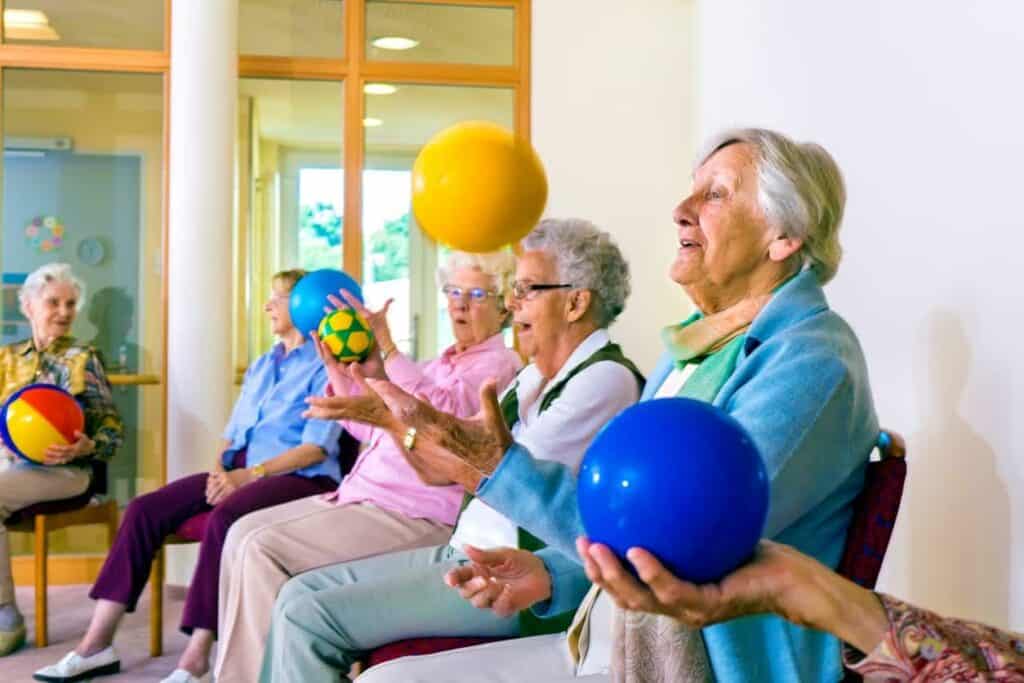
- Nutritious Diet
The food offered is well-balanced and caters to residents’ dietary needs and preferences. Proper nutrition is essential for overall health and well-being, particularly in individuals with LBD who may have eating and swallowing difficulties.
- Respite for Family Caregivers
Assisted living can provide family caregivers with a much-needed respite. This will allow you to rest, recharge, and focus on your own well-being while knowing that your loved one is receiving professional care.

- Healthcare Resources
Many assisted living facilities have access to healthcare resources, including nurses and therapists, who can address urgent or changed medical and health-related needs as they arise.
- Support for Families
Assisted living communities can offer family support and education programs to help you and your family understand LBD, learn coping strategies, and stay involved in your loved one’s care.
While assisted living communities offer numerous benefits for individuals with LBD, it’s important to select a facility carefully.
Doing some research and visiting potential centers can ensure you they meet the specific needs and preferences of your beloved.
Consulting with healthcare professionals and specialists in dementia care can also provide valuable guidance in making the right choice.
Specialized Programs and Activities for People with LBD
Specialized dementia care programs and activities for patients with Lewy body dementia (LBD) focus on providing individualized support and engagement adjusted to the unique needs and challenges of individuals with this condition.
These programs aim to enhance
cognitive function,
manage behavioral symptoms, and
improve overall quality of life.
Some examples of specialized dementia care programs and activities suitable for individuals with Lewy body dementia are:
Cognitive Stimulation Activities
Engaging in activities that stimulate cognitive function is essential for individuals with LBD. These kinds of activities may include puzzles, memory games, word games, and reminiscence therapy, which encourages the recall of past experiences and memories.
Music Therapy
Music has a calming and therapeutic effect on seniors with LBD. Music therapy sessions, which include singing, playing musical instruments, or listening to familiar songs, can enhance mood and cognitive function.
Art Therapy
Art therapy allows individuals to express themselves creatively through various art forms such as painting, drawing, and crafting. It can be a valuable means of self-expression for those who have difficulty communicating verbally.
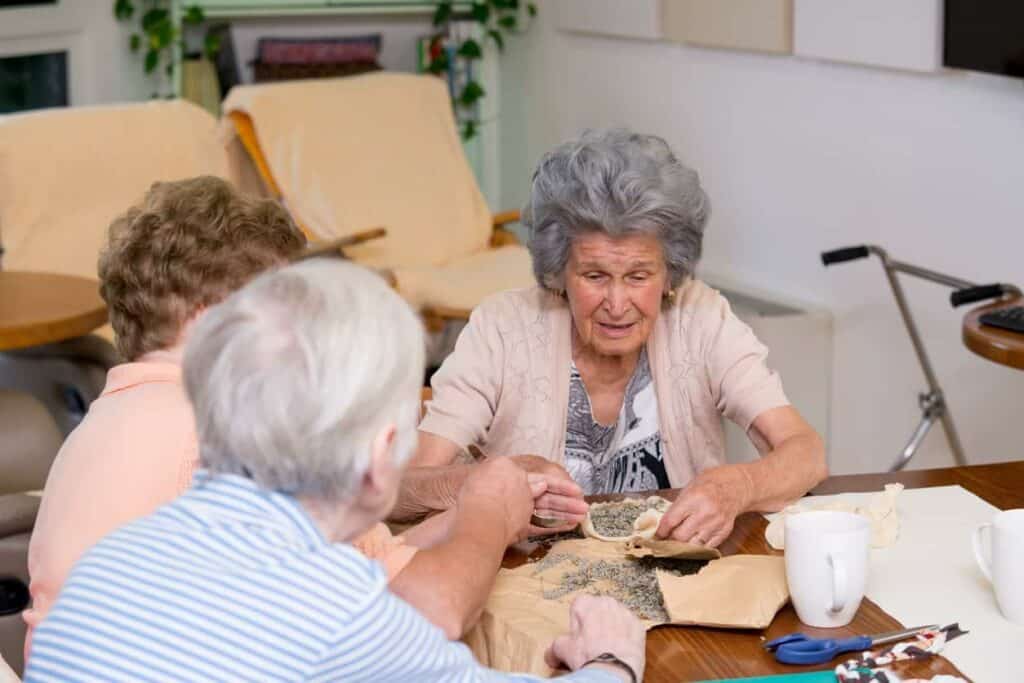
Reality Orientation
Reality orientation techniques help individuals with LBD stay connected to their surroundings and maintain a sense of presence in the here and now. Memory boards, calendars, and labeled objects can assist in orientation.
Validation Therapy
Validation therapy is a person-centered approach that acknowledges and validates the feelings and emotions of patients with LBD, even if they are based on false beliefs or delusions. It focuses on empathy and emotional support.
Sensory Stimulation
Sensory activities, such as aromatherapy, tactile activities, and sensory gardens, can promote relaxation and reduce agitation in people suffering from LBD.
Physical Activity
Tailored physical exercises, such as chair exercises, stretching, and gentle movements, can promote and maintain mobility and coordination. Physical activity should be adapted to the senior’s abilities. Tai chi and yoga are gentle forms of exercise that can improve balance, flexibility, and relaxation while reducing stress and anxiety.
Pet Therapy
Interactions with calm or specially trained animals, such as dogs or cats, can provide comfort, reduce anxiety, and offer emotional support.
Group Activities
Group activities encourage social interaction and engagement. These may include group discussions, story-sharing sessions, and cooperative games that foster a sense of community.
Gardening
Access to outdoor spaces and gardening activities can be therapeutic. Gardening provides sensory stimulation, a chance for physical activity, and a sense of accomplishment.

Cooking and Baking
Supervised cooking or baking activities can engage individuals in familiar tasks and provide sensory experiences through handling ingredients and enjoying the aroma of food. These activities are also a good chance for socialization with loved ones.
Life Skills Reminiscence
Encourage individuals to participate in reminiscence activities related to daily life skills, such as setting the table, folding clothes, or arranging flowers.
Multi-Sensory Rooms
Some dementia care facilities offer multi-sensory rooms equipped with sensory lighting, music, and tactile materials to provide a soothing and stimulating environment.
Reality Orientation through Technology
Virtual and augmented reality programs can create immersive and engaging experiences that stimulate cognitive function.
Knowing your loved one’s interests, abilities, and preferences is crucial when designing and implementing specialized dementia care programs and activities.
Additionally, flexibility is key, as the needs and capabilities of your beloved may change over time.
The primary goal is to enhance their overall well-being and maintain their dignity and quality of life throughout the progression of Lewy body dementia.
In a Nutshell
Lewy body dementia is a progressive cognitive condition that can present with a variety of symptoms and behaviors in different people and at different stages of the disease.
Diagnosing it is a complex task and may take some time as it can coexist with other forms of dementia, and as specialists need to exclude other diseases with similar symptoms.
Managing Lewy body dementia requires a holistic approach that takes into account both cognitive and motor symptoms and considers the individual’s unique needs and sensitivities to medications.
You should work together with your loved one’s healthcare professionals to develop a care plan tailored to the specific challenges presented by Lewy body dementia.
Knowing what to expect, how to best take care of your loved one, and being prepared for the future may involve
- ongoing consultations with dementia care specialists,
- enrolling in various programs, and
- finding a caring assisted living facility like Amy’s Eden to rely on.
You can contact us at
Amy’s Eden to learn more about how we can help, or come and visit one of
our homes.
Resources
https://www.lbda.org/10-things-you-should-know-about-lbd/
https://www.nia.nih.gov/health/topics/lewy-body-dementia
https://lewybodyresourcecenter.org/what-is-lbd/diagnosis/
https://measurabilities.com/7-stages-of-lewy-body-dementia/
https://neuro.psychiatryonline.org/doi/epdf/10.1176/jnp.12.4.425
https://www.nia.nih.gov/health/caring-person-lewy-body-dementia#changes
https://www.frontiersin.org/articles/10.3389/fneur.2020.00610/full

 LBD encompasses two main clinical diagnoses: dementia with Lewy bodies and Parkinson’s disease dementia, both of which have similar underlying pathology.
This article will shed some light on
LBD encompasses two main clinical diagnoses: dementia with Lewy bodies and Parkinson’s disease dementia, both of which have similar underlying pathology.
This article will shed some light on


 Once a diagnosis is confirmed, you and your loved one can work with healthcare specialists to develop a care plan that addresses symptoms, provides support, and ensures the best possible quality of life.
Once a diagnosis is confirmed, you and your loved one can work with healthcare specialists to develop a care plan that addresses symptoms, provides support, and ensures the best possible quality of life.








